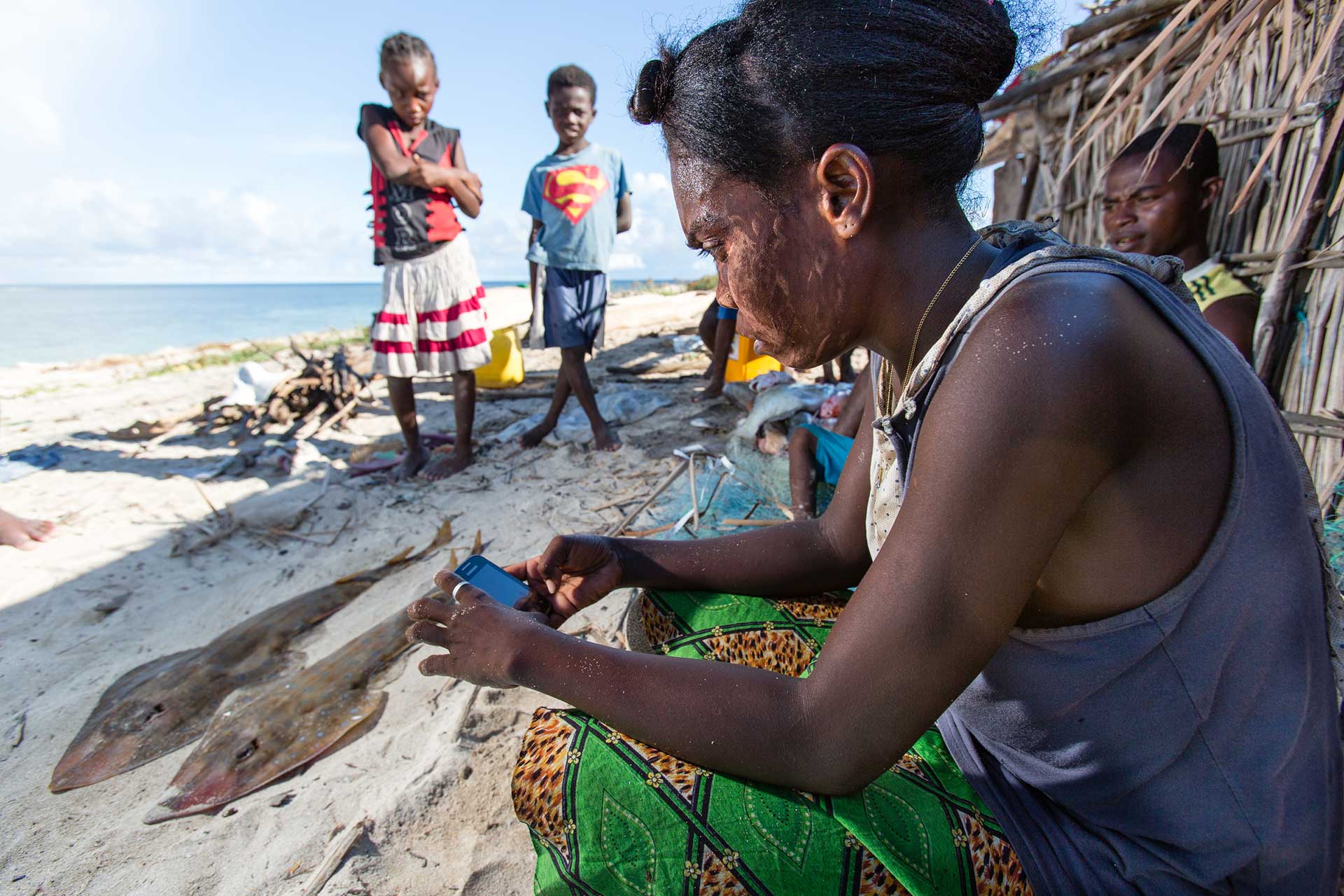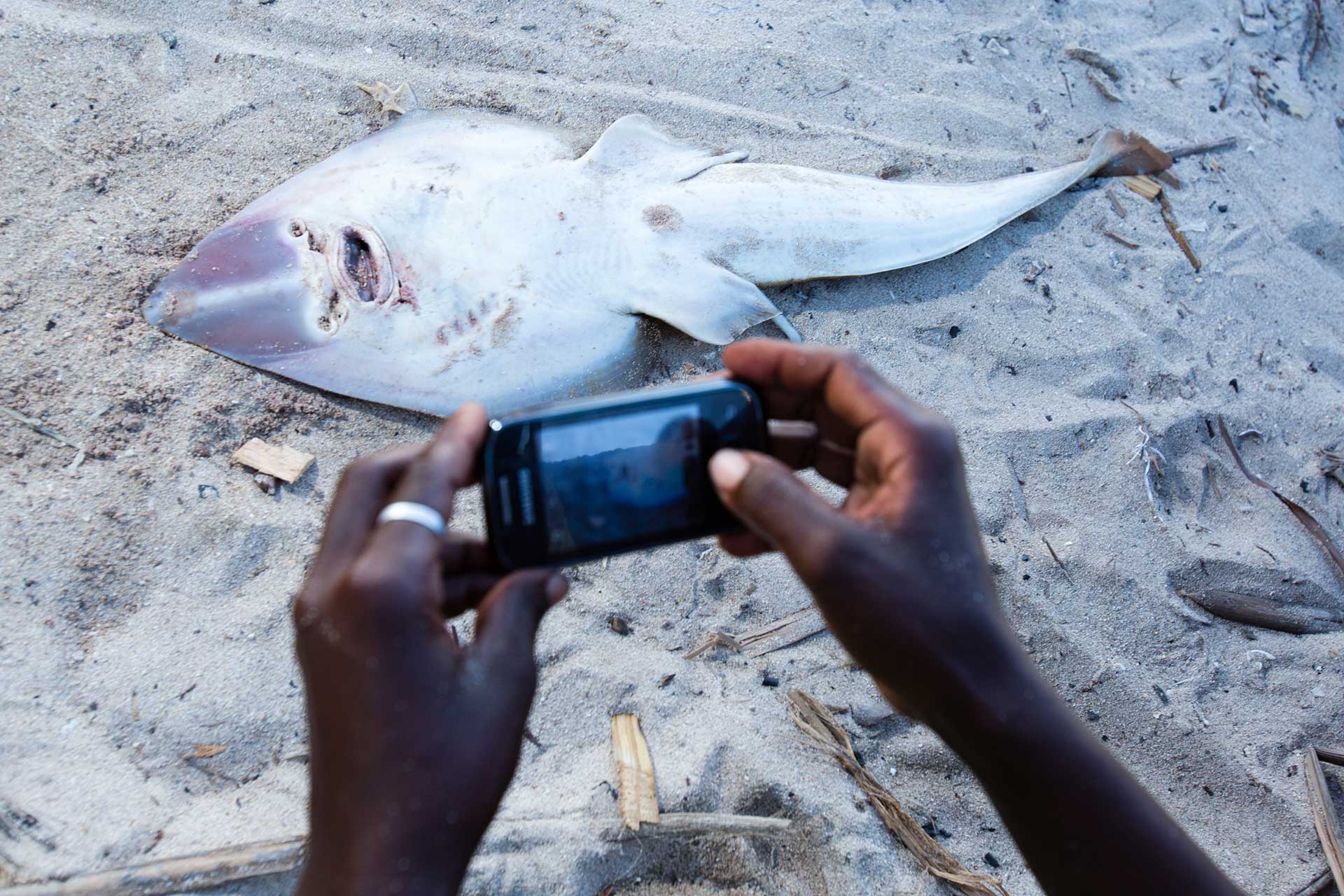From Montreal to Madagascar: mobile monitoring back home
During my journey from Tuléar to Andavadoaka we drove along the coast where there is an astonishing view of blue sky, white sand and blue sea that in my adopted country of Canada you see only as a desktop background. I could not believe that I was now back on Paradise Island and thanked heaven that this island is my home country. When I saw this view, I understood why so many foreigners want to live in Madagascar or come here on holiday. The south-west of the island is a natural aquarium and protecting this richness an important mission. There are so many things to do and to develop here, and all we need is people who have courage and goodwill.

Jean Rosy tests out a new smart phone pen. Photo © Thierry Nohasiarivelo | Blue Ventures
I last visited Andavadoaka in 1989, when it was a small village with a population of less than 400 people, mostly fishermen. The Catholic mission was already here and I remember my family taking a photograph of the statue of the Virgin Mary on the cliff above Andavadoaka. There were no octopus fishing closures then and there seemed to be enough resources to support the local families. Now things have changed considerably and the population in the village has increased, putting more pressure on marine resources. Today we have a hospital, primary and secondary schools, a village market and bungalows for tourists!It was a good moment for me when I took a trip in a pirogue for the first time since returning to Madagascar. I was so afraid that I would be seasick, but luckily after travelling for five hours from Andavadoaka to Morombe I was feeling fine and the captain was so proud of me. ‘You are a real Vezo, Thierry,’ he said. ‘You are not seasick!’ This was a relief, as I often have to travel by pirogue to visit shark data collectors.

Thierry teaching octopus data collectors. Photo © Xavier Vincke
Since I started in the role of coordinating mobile data collection for Blue Ventures, we have continued to conduct refresher courses in using ODK every month and in order to get feedback we have visited the numerous remote villages scattered throughout the Velondriake LMMA where the data collectors live. We listen to their concerns about the work and the phone and try to make changes and provide solutions. For example, Jean Rossy from Ampasilava, the next village along the coast, said to us, ‘My fingers are too big and I make mistakes sometimes!’ So we have introduced smartphone pens to make it easier for the data collectors and to reduce mistakes. The data collectors are still using paper as well as smartphones so that we can check accuracy, but our ultimate goal is for them to send data via the phones to the online database. In remote parts of Madagascar, though, there is also the issue of connectivity. In some villages connectivity is good, but in others there is often insufficient network strength. Then we have to transfer data from the phones onto a computer and from there to the online database. However, the network is improving all the time, so we hope this will change soon!

A datacollector records a guitarshark. Photo © Garth Cripps | Blue Ventures
In 2015, we also started conducting trials for collecting octopus fisheries data via ODK. In November 2015 we reviewed the octopus data being collected and improved the methodology. Since then we have had many one-on-one training sessions and it has been very rewarding to see the data collectors improve in confidence and ability. We have been able to apply many lessons learnt from the shark-monitoring project to this project and we hope that the extended trial will be successful and that octopus monitoring can be taken to other villages. The next phase of the project is to try different methods to communicate the results back to the community via the phones, in addition to the regular feedback meetings in person. I am happy to be involved in this phase, as I hope we can provide some answers for the communities. ‘What has happened to our shark populations?’ they ask, and ‘What is the state of our marine resources?’ By presenting the data to them and explaining what they show, we can answer the communities’ questions.

Recording a guitarshark. Photo © Garth Cripps | Blue Ventures
The sea is the rice field of the Vezo community, providing the majority of the food for its families. It is also the people’s workplace and revenue provider. Working with the community is really rewarding because I feel like I can transfer my knowledge to help improve local livelihoods. And as a Vezo, it is my duty to help my community use resources sustainably!Blue Ventures is currently conducting trials for the monitoring of shark and octopus fisheries by mobile phone, as well health clinic and census data. The organisation’s shark-monitoring project is supported by the Save Our Seas Foundation. ODK (Open Data Kit) is open-source software that can be customised and used to collect data via mobile devices.
